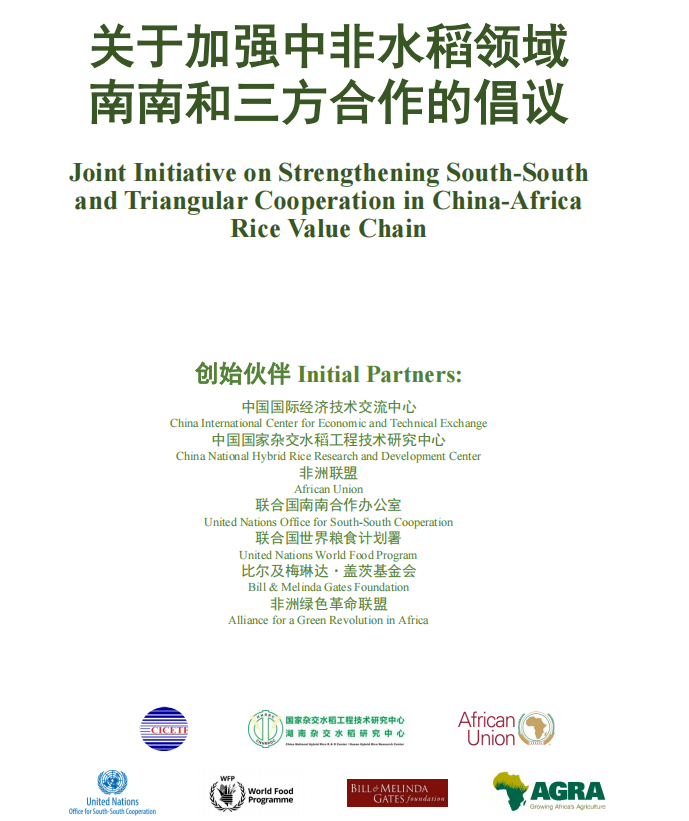
Joint Initiative on Strengthening South-South and Triangular Cooperation in China-Africa Rice Value Chain
Changsha, China June 27, 2019
Recognizing that:
Agricultural exchanges and cooperation have always been an important area and a major component of China-Africa friendship, with a long history, solid foundation and fruitful achievements. The "Eight Major Initiatives" announced at the Beijing Summit of the Forum on China-Africa Cooperation (FOCAC) in 2018 once again emphasized the priority and importance of China-Africa agricultural cooperation, where it was clearly stated that China will support Africa in achieving general food security by 2030, and work with Africa to formulate and implement a program of action to promote China-Africa cooperation on agricultural modernization.
Rice is either a staple or alternative food crop in many African countries. African countries suffer from serious production and consumption gaps and rely heavily on imports. The interest to expand rice production by African countries, development partners and international institutions is manifested by a series of alliances and initiatives, including the Coalition for African Rice Development (CARD), the Competitive African Rice Initiative (CARI), the African Rice Initiative (ARI), the Regional Rice Offensive of ECOWAS and the West African Agricultural Transformation Programme (WAATP), etc. Africa has the resources to expand rice growth including a large amount of land suitable for rice production. Despite the progress made so far, there is scope to introduce high-yield varieties, improved production and processing technologies and to invest in a rice industry including related supply chains.
China has a long history of rice cultivation. In particular, during the recent four decades of reform and opening-up, the rice industry has achieved remarkable advancement and made great contributions to the overall economic development, agricultural transformation and poverty reduction in China. China has accrued valuable experience and significant comparative advantage in improved seed varieties, rice production and processing, technology and machinery, demonstration and promotion, industrial investment and marketing etc. There is an obvious complementarity and potential in China-Africa agricultural cooperation, especially in the rice value chain.
Eradicating all forms of hunger and malnutrition by 2030 is among the crucial goals under the United Nations 2030 Sustainable Development Agenda. It has been recognized globally that it is imperative to significantly enhance agricultural production and improve agricultural productivity. In addition, the United Nations attaches great importance to South-South and triangular cooperation. The UN General Assembly expressly established the Office for South-South Cooperation (UNOSSC) to advocate for and coordinate South-South cooperation among developing and triangular partnerships with developed countries on a global and UN system-wide basis. And UNOSSC has for a long time supported the development of rice in Africa to improve food security as one of the priorities. WFP and other UN organizations have been supporting and facilitating South-South and triangular cooperation in agriculture sectors, especially on rice production and value chain development, and have achieved significant results and made positive development impact. Other international and regional organizations and institutions such as the Bill & Melinda Gates Foundation and the Alliance for a Green Revolution in Africa (AGRA) actively support and participate in South-South and triangular cooperation.
China, the world's largest developing country, is a firm advocate, active participant and important contributor to South-South cooperation. The vast majority of African countries are very willing to work with China to develop broader and deeper South-South and triangular cooperation arrangements.
To this end, the parties propose:
Guided by the vision of achieving Sustainable Development Goals, leaving no one behind, which is also in line with the vision of constructing a shared community of human destiny, adhering to the principles of South-South and triangular cooperation, to actively explore ways to further strengthen China-Africa rice value chain cooperation, through leveraging each partner's comparative advantage.
1. Systematically review and summarize the development experience and appropriate technologies of China's rice industry as well as the local needs of the rice industry in Africa, assess the key directions and key areas of rice technology transfer, demonstration and investment promotion, formulate constructive suggestions and policy advice for rice value chain development in relevant African countries taking into account the other SDGs including ending poverty, gender equality and climate action, etc..
2. Actively support and organize professional exhibitions and investment matchmaking activities to promote the transfer, adaptation and investment in suitable rice technologies, products, equipment machinery, etc., and actively facilitate business matchmaking in the rice value chain.
3. In response to local demand from African countries and considering the situations of China's investment and technology transfer in rice industry of Africa, selectively carry out R&D that are suitable to local technologies, solve key bottlenecks in seed, technology, machinery and commercialization to promote value chain upgrading and agricultural transformation.
4. Leveraging selected China-aided agricultural technology demonstration centers, China-Africa cooperation agricultural demonstration parks and other platforms, experimentally carry out local planting and technology popularization in larger areas, increase wider adoption of Africa-suitable and environment friendly varieties among smallholder farmers, encourage reasonable and sustainable usage of fertilizers and pesticides, optimize field management, increase productivity and independent production capacity.
The cooperation initiative is released in Chinese and English on June 27, 2019 in Changsha, China.
Initial Partners
China International Center for Economic and Technical Exchange (CICETE)
China National Hybrid Rice Research and Development Center (CNHRRDC)
African Union (AU)
United Nations Office for South-South Cooperation (UNOSSC)
United Nations World Food Program (WFP)
Bill & Melinda Gates Foundation (BMGF)
Alliance for a Green Revolution in Africa (AGRA)

